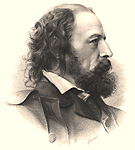 |
Alfred Tennyson (1809 – 1892) was Poet Laureate of Great Britain during much of Queen Victoria’s reign and remains one of the most popular British poets. He is the most frequently quoted author in the Oxford Dictionary of quotations, such as “‘Tis better to have loved and lost / Than never to have loved at all”, “Theirs not to reason why, / Theirs but to do and die” |
Alfred Tennyson – About
English author often regarded as the chief representative of the Victorian age in poetry. Tennyson succeeded Wordsworth as Poet Laureate in 1850; he was appointed by Queen Victoria and served 42 years. Tennyson’s works were melancholic, and reflected the moral and intellectual values of his time, which made them especially vulnerable for later critic.
Alfred, Lord Tennyson was born in Somersby, Lincolnshire. His father, George Clayton Tennyson, a clergyman and rector, suffered from depression and was notoriously absentminded. Alfred began to write poetry at an early age in the style of Lord Byron. After spending four unhappy years in school he was tutored at home. Tennyson then studied at Trinity College, Cambridge, where he joined the literary club ‘The Apostles’ and met Arthur Hallam, who became his closest friend. The undergraduate society discussed contemporary social, religious, scientific, and literary issues. Encouraged by ‘The Apostles’, Tennyson published POEMS, CHIEFLY LYRICAL, in 1830, which included the popular ‘Mariana’. He travelled with Hallam on the Continent. By 1830, Hallam had become engaged to Tennyson’s sister Emily. After his father’s death in 1831 Tennyson returned to Somersby without a degree.
His next book, POEMS (1833), received unfavorable reviews, and Tennyson ceased to publish for nearly ten years. Hallam died suddenly on the same year in Vienna. It was a heavy blow to Tennyson. He began to write ‘Im Memorian’ for his lost friend – the work took seventeen years. A revised volume of Poems, which included the ‘The Lady of Shalott’ and ‘The Lotus-eaters’. ‘Morte d’Arthur’ and ‘Ulysses’ appeared in 1842 in the two-volume POEMS, and established his reputation as a writer. In ‘Ulysses Tennyson portrayed the Greek after his travels, longing past days: “How dull it is to pause, to make an end, / To rust unburnished, not to shine in use!”
After marrying Emily Sellwood, whom he had already met in 1836, the couple settled in Farringford, a house in Freshwater on the Isle of Wright in 1853. From there the family moved in 1869 to Aldworth, Surrey. Tennyson’s life was then uneventful. In London he was a regular guest of the literary and artistic salon of Mrs Prinsep at Little Holland House. During these later years he produced some of his best poems.
Among Tennyson’s major poetic achievements is the elegy mourning the death of his friend Arthur Hallam, In Memoriam (1850). The personal sorrow led the poet to explore his thoughts on faith, immortality, and the meaning of loss:
“O life as futile, then, as frail!
O for thy voice to soothe and bless!
What hope of answer, or redress?
Behind the veil, behind the veil.”
Among its other passages is a symbolic voyage ending in a vision of Hallam as the poet’s muse. Some critics have seen in the work ideas, that anticipated Darwin’s theory of natural selection. “Who trusted God was love indeed / And love Creation’s final law – / Tho’ Nature, red in tooth and claw / With ravine, shriek’d against his creed – “, the poet wrote. He was born in the same year as Darwin, but his view about natural history, however, was based on catastrophe theory, not evolution. The patriotic poem ‘Charge of the Light Brigade’,published in MAUD (1855), is one of Tennyson’s best known works, although first Maud was found obscure or morbid by critics ranging from George Eliot to Gladstone. Later the poem about the Light Brigade inspired Michael Curtiz’s film from 1936, starring Errol Flynn. Historically the fight during the Crimean war brought to light the incompetent organization of the English army. However, the stupid mistake described in the poem honored the soldier’s courage and heroic action.
In the 1870s Tennyson wrote several plays, among them poetic dramas QUEEN MARY (1875) and HAROLD (1876). In 1884 he was created a baron. Tennyson died at Aldwort on October 6, 1892 and was buried in the Poets’ Corner in Westminster Abbey. Soon he became the favorite target of attacks of many English and American poets who saw him as a representative of narrow patriotism and sentimentality. Later critics have praised again Tennyson. T.S. Eliot has called him ‘the great master of metric as well as of melancholia’ and that he possessed the finest ear of any English poet since Milton.
Poems of Alfred Tennyson
- A Farewell
- After-Thought
- Break, Break, Break
- Cradle Song
- Crossing The Bar
- Flower In The Crannied Wall
- In Memoriam
- In Memoriam A.H.H. XXVII
- In The Valley Of The Cauteretz
- Morte D’Arthur
- Sir Galahad
- St. Simeon Stylites
- Tears, Idle Tears
- The Charge Of The Light Brigade
- The Death Of The Old Year
- The Deserted House
- The Lady Of Shalott
- The Lotus-Eaters
- The Revenge: A Ballad Of The Fleet
- Tithonus
- Ulysses
View: Tennyson Poems
Quotes of Tennyson
“‘Tis better to have loved and lost
Than never to have loved at all”,
~
“Theirs not to reason why,
Theirs but to do and die”
~
“My strength is as the strength of ten,
Because my heart is pure”
~
“To strive, to seek, to find, and not to yield”
~
“Knowledge comes, but Wisdom lingers”
~
“The old order changeth, yielding place to new”.
External Links
